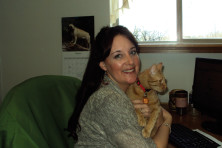How I Came to Love the Alewife
- Share
- Tweet
- Pin
- Share
Like any sensible Door County resident, I make a point to spend at least a few minutes each summer cursing the alewife. Though I occasionally attempt to dredge up some sympathy for the scaly little rascals – as a native Minnesotan, I feel a certain sense of obligation toward my fellow invasive species – the stench rising from an otherwise pristine beach usually squelches my compassion in short, choking order. More often, I wear my knee-jerk revulsion to the alewife as a badge of pride, offering it as a sign that I am truly integrated into the great Door County melting pot, that I am slowly but surely trading in my status of immigrant for that of full Door County citizen.
And so it was with a proud sort of disgust that I learned that the commute to my new job in Boston involved a daily trek of epic proportions to and from a place called – you guessed it – Alewife. The Massachusetts Alewife lies at the opposite end of the subway line from my apartment, the Bostonian equivalent of commuting to Gills Rock from Sturgeon Bay, except that instead of listening to WDOR and watching for deer in the ditches off Highway 57, I read novels and try to drown out the loudspeaker’s persistent repetition of my fishy destination. As you may know, the directional description of a train is tied inextricably to its last stop, so I am given at least two dozen opportunities daily to think of Door County’s most notorious bad guy: "The next train to Alewife is now approaching." "This train is going to Alewife." "Last stop, Alewife."
To be fair, I rarely run short of reasons to remember Door County. I have strong family ties to the peninsula (my grandmother was born there and my grandfather still lives there, along with a tangled web of aunts, uncles, and cousins), and for the last several years I’ve built a nomadic life around Door County summers and falls, working for whichever theaters, newspapers, or cherry orchards will have me. Door County feels like home.
I’ve asked around, and rumor has it the proper place to be three years after college is in what is snobbishly referred to as "a real job," typically defined as a job with the potential to last longer than your average college semester. But years of on-site research have led me to the conclusion that the propagators of the "real job" myth have never tasted Door County whitefish or seen Toft Point in October.
And so I spend my winters trying to cobble together enough adventure to make a Door County-centered life worthwhile, even when it makes my years seem a bit scattered. After my first few Door County summers, I was able to retreat into the ideally timed calendar of academia. Since graduation, it’s been trickier: I’ve spent one winter in France and one in Minneapolis, and this year decided to split the geographic difference and head to Boston, a faraway land inhabited by aquatic-sounding subway stations and, as you may have heard, football fans who are almost – I said almost – as passionate as those found back in Packerland.
Even during the winter, when I am far away, I find that Door County is the framework around which I build my life. It seems that if I’m not using my city-fast broadband connection to email a dial-up-bound friend in Baileys Harbor, I’m reading the Pulse online, or getting together with my old friend Karen Mal, whom I first met in Fish Creek over 15 years ago.
I’m amazed by how many excuses my mind finds to wander over to Door County on a daily basis. Even more remarkable is the idea of who-knows-how-many-dozens of us across the world participating in this annual ritual of homesickness, regularly making the mental drive north along Green Bay and silently thanking those of you who’ve held down the peninsular fort during what has reportedly been a winter for the books.
Boston’s gotten its fair share of snow this winter, and it does boast its own impressive body of water along which to drive, but it’s just not the same in a city. The snow melts faster and they don’t boil their fish in big iron pots. Which is why I feel compelled to relate to you the following story, which I assure you is true, no matter how tightly your credulity is stretched by its unlikely string of Door County coincidences:
As I write this, I am on a train headed to Portland, Maine, where I will be met at the station by fellow Pulse contributor and dear Door County friend Emilie Coulson. The unmistakable voice of American Folklore Theatre co-founder Fred Alley is playing on my iPod, and my grandfather just called to report that the mercurial Sister Bay sky has dumped another three inches of snow on his already-white yard. It’s dark out; I can’t see much out the windows. But as we roll along, we suddenly pass one brightly lit town that looks so much like Door County I do a double-take; it is as if my home-bound thoughts have been brought to life in the train window. I see homes that sit at the edge of the ocean’s huge watery shadow, jagged icicles hanging from their eaves, rolling snowdrifts in their yards, smoke rising from their chimneys. In that moment, I almost can’t believe I’ve made it for three months surrounded by concrete and blacktop, and I feel pre-emptively wistful about the short length of the rural respite awaiting me.
But I don’t have to feel wistful for too long – soon Emilie will pick me up at the train depot and whisk me away to a weekend of reminiscing and frolicking in Maine’s record-high snowdrifts. And on Monday morning, having fully recharged my small-town-starved energy reserves, I will be back in Boston, ready to begin a day in the city with the privilege of yet another voyage toward that newly welcome homing device of a word: This train is going to Alewife.




